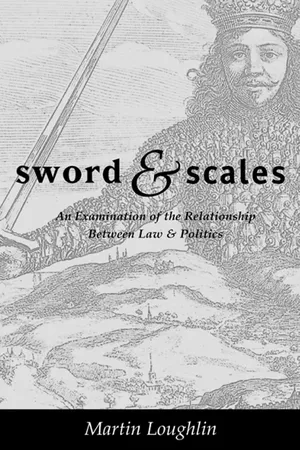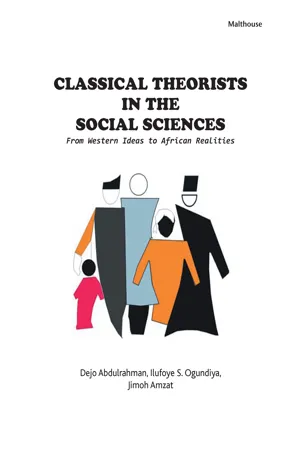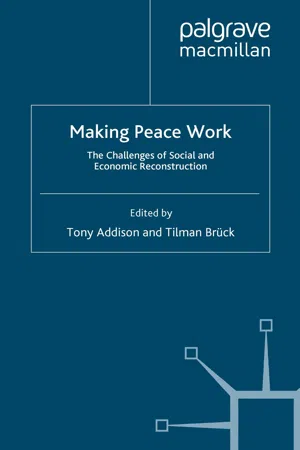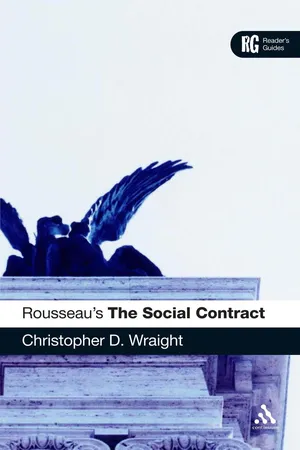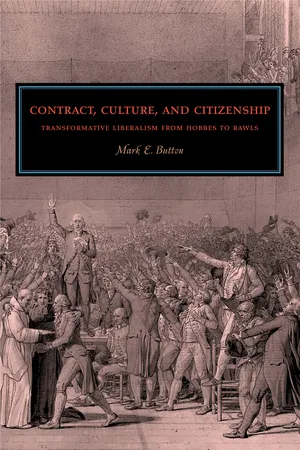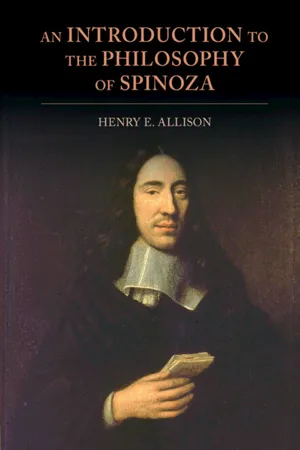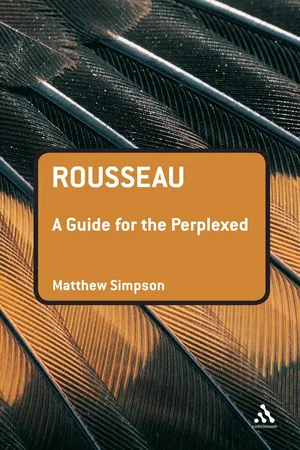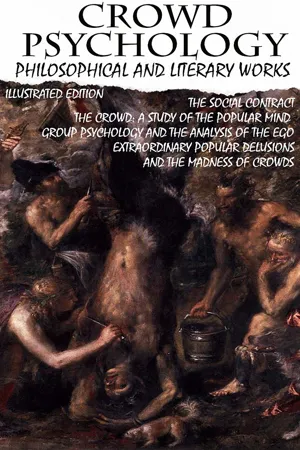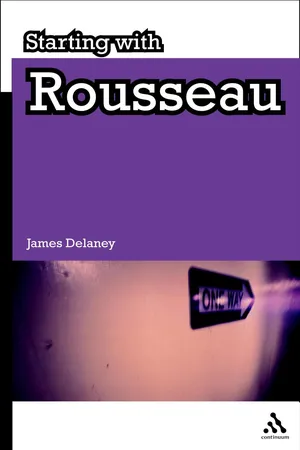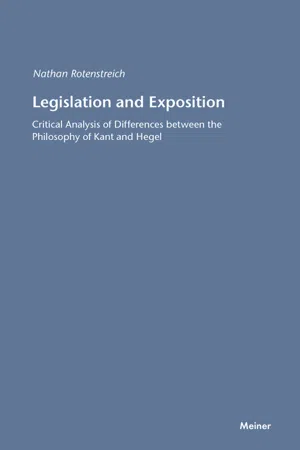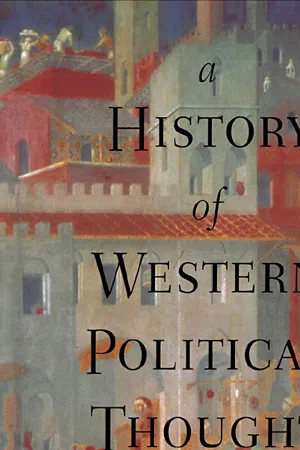Politics & International Relations
The Social Contract
"The Social Contract" is a political theory proposed by philosophers like Jean-Jacques Rousseau, which explores the idea of a hypothetical agreement among individuals to form a society and a government. It suggests that individuals willingly give up some freedoms in exchange for the protection and benefits provided by the government. This concept has had a significant influence on political thought and the development of modern states.
Written by Perlego with AI-assistance
Related key terms
1 of 5
12 Key excerpts on "The Social Contract"
- eBook - PDF
Sword and Scales
An Examination of the Relationship between Law and Politics
- Martin Loughlin(Author)
- 2000(Publication Date)
- Hart Publishing(Publisher)
The relationship between the individual and the State, in short, is one of contract. In this chapter, I propose to examine how the device of The Social Contract came to be invoked as a foundational principle in politics, first (with Hobbes) to establish the authority of government and later (with Locke) to impose limits on that governmental authority. I shall argue that the use of this device marks an important stage in the evolution of politico-legal thought: not only is it associated with the emergence of a belief that political power vests ultimately in individuals who consen-sually and conditionally delegate that power to the State, but it also provides the source from which springs the notion that governance is a function of law rather than of political will. The notion of The Social Contract thus is central both to the evolution of a modern idea of the constitution and to the elaboration of a political theory of rights, themes which are developed in the following two chapters. In this chapter, however, my main objective will be to sketch the ways in which this contractual metaphor has been used to establish a form of political authority and, given its legal connotations, to consider the extent to which it has been used for the purpose of inscribing law into the foundations of politics. NATURAL RIGHTS , COVENANTS AND POLITICAL ORDER Most of the early-modern political thinkers accepted the existence of a fundamental law of self-preservation. They believed in a law of nature which recognized the basic right of all individuals both to defend them-selves against attack and to acquire the necessities of life. They also accepted that mutual recognition of these natural rights would not, in itself, be sufficient to sustain a social order. For Hobbes, the lack of a 162 Sword and Scales 3 Jean-Jacques Rousseau, The Social Contract [1762] Maurice Cranston trans. and intro. (Harmondsworth: Penguin, 1968), Bk. I, ch. I. - eBook - PDF
Classical Theorists in the Social Scienc
From Western Ideas to African Realities
- Dejo Abdulrahman(Author)
- 2023(Publication Date)
- Malthouse Press(Publisher)
5 John Locke, Jean Jacques Rousseau and Social Contract Theory Implications for Contemporary Nigerian Politics Luqman Saka, , O. M. Adebiyi and, A. R. Bakare Introduction The Social Contract theory was aptly described by philosophers as the basis for the establishment of the modern state system. Philosophers like Plato and Aristotle postulated that The Social Contract theory is the foundation for order, law, justice and governance. The development of The Social Contract theory can actually be credited to Thomas Hobbes but philosophers like Plato and Aristotle mentioned the contract theory in their writings. For instance Plato asserted that “the state was created by men, a product of social contract” (SEP, 2005). He also noted that the city (Polis) arose due to the failure of man in providing all his basic needs. Thus, man needed the contributions of others. In the Republic, Plato writes: “The men, being in want of many things gather into one settlement, many partners and helpers to satisfy their diverse needs.” Plato’s idea here implies „contract and an agreement’, since the purpose of coming together is to help each other so that the polis will be sustained, avoiding injustice and embarrassment, and encouraging total and mutual respect for individual rights (Uchenu, 2010). The generic notion of The Social Contract theory arose out of the state of nature where there was no presence of government. Under this condition men behaved without rules. Life under this condition according to Hobbes will not be pretty and that unbounded liberty can be very dangerous and life without any rules at all would, be “solitary, nasty, brutish, and short” (Forsyth, 1994:37). Social contract theory is rightly associated with modern political theory and is given its first full exposition and defence by Thomas Hobbes. After Hobbes, John Locke and Jean-Jacques Rousseau are the best known proponents of this influential theory about the origin of the state (Friend, 2004). - eBook - PDF
Making Peace Work
The Challenges of Social and Economic Reconstruction
- T. Addison, T. Brück, T. Addison, T. Brück(Authors)
- 2008(Publication Date)
- Palgrave Macmillan(Publisher)
A secular form of social contract represents moral principles as the ideal terms of social co-operation for people who (want to) live together in fellowship, and regard each other as equal, rational and autonomous moral agents. This mutual respect and recognition of equal moral agency is taken to be the condition of an ideal agreement. This agreement defines the social arrangements governing the relations between individuals – and, in a wider context, individuals and the state – as the institutional organiza- tion of political authority. Overall, The Social Contract derives the moral code for political order that is to be accepted by all parties from a hypothetical consent from the governors themselves. Within this method of legitimating political authority, there is room for various concepts of good. It also respects different beliefs and sets of values, as long as the individuals believing in them have agreed on certain principles of justice that, at least, set procedural stan- dards of right and wrong for the institutional structure of society and public life. It protects the heterogeneity of society and inclusion of all based on their equal value. In the realist tradition, the idea of social contract is based on a hypothetical or imaginary contract between self-interested, autonomous and fully rational people who agree on certain limitations of justice to their ‘natural unlimited rights and freedoms’ in exchange for their personal security and political order. Thomas Hobbes (1588–1679), for instance, offered a social contract in which the sovereign ruled in order to avoid everyone engaging in war against everyone else in the state of nature. In this state of nature, nothing is unjust and everyone has unlimited rights to everything. Thus, there is no security. For Hobbes, justice and injustice arise in the social context, and the common- wealth was needed to establish security and justice. - eBook - PDF
Rousseau's 'The Social Contract'
A Reader's Guide
- Christopher D. Wraight(Author)
- 2008(Publication Date)
- Continuum(Publisher)
19 CHAPTER 3 READING THE TEXT BOOK I The ideas Rousseau expounds in The Social Contract were originally envisaged as part of a planned larger work to be called ‘Political Institutions’. However, Rousseau abandoned his intentions for this more ambitious scheme, and The Social Contract remains his most complete work on politics and political philosophy. It is also his most famous and widely read book, the one on which his reputation as a thinker and writer is chiefly based. Despite this, it is relatively short and compact, and much of the important content is compressed into the first two books of the four-book whole. On the surface it is decep-tively easy to read, and major ideas are expressed in a concise manner which is refreshingly different from some other more ponderous works of political philosophy. However, this very concision can hide real difficulties in interpretation. As we shall see, it can occasionally be difficult to see what Rousseau means by some of the core terms he advances, even when he himself seems to think their significance must be readily apparent. As a result, there is by no means complete agree-ment among Rousseau scholars on the best interpretation of such sometimes elliptical ideas. Nonetheless, within the comparatively brief text, there is a wealth of original and provocative thought, much of which continues to exercise political theorists in our own time. In what follows, the intention is to give a comprehensive overview of the important themes and ideas of The Social Contract , as well as an introduction to some of the controversies and difficulties they throw up. As we have seen from a consideration of Rousseau’s life and early political writings, the subject of a just and equitable society was never far from his thoughts. His frequent dismay at the problems - eBook - PDF
Contract, Culture, and Citizenship
Transformative Liberalism from Hobbes to Rawls
- Mark E. Button(Author)
- 2008(Publication Date)
- Penn State University Press(Publisher)
We must recall that the relationship between subject and sovereign is always, in part, an intra- political and intrapersonal association, and one, as we have noted, that is not inherently or naturally harmonious. Keeping this in mind, the act of making The Social Contract generates a promise of Wdelity on the part of individuals (and the private, subjective side within each individual) that no subject can have complete conWdence in either meaning or knowing fully what it does or will entail, or whether he shall be able to continue to abide by and keep such a promise in the future. The Social Contract, in other words, engages individuals in the promise to become what they are not either by nature or by history: citizens of an always speciWc and limited polity. Rousseau appreciates, as do Hobbes and Locke, that making citizens of men is not the labor of a single day or the product of a singular, magical act. 13 Mutual promising and contract are fundamental to enacting the “re- markable change in man” that Rousseau avers takes place in the passage from the “state of nature” to the civil state, because such an act makes men, Wrst, compelled to keep trust, and by dint of practice, habituation, and internal struggle, actually trustworthy.This progressive, developmen- tal quality of the contractual relationship, and the challenges it entails, can also be seen in a crucial stage of Émile’s education. In this instance, the tutor and his pupil make a mutual promise or “contract” and so ground the tutor’s authority on Émile’s will rather than the (temporary) conditions imposed by his immaturity. In this context the problem for the tutor is to show Émile the dangers of making promises and undertak- ing difWcult commitments without sufWcient examination or deliberation. Rousseau’s Contractarian Republic 179 12. Ibid., 1.7, p. 55. Recall that Spinoza also saw the basic stability of a regime as depen- dent on the virtue of Wdelity. - eBook - PDF
- Henry E. Allison(Author)
- 2022(Publication Date)
- Cambridge University Press(Publisher)
Subsequently, however, it was understood to include two distinct concep- tions, which, while closely connected, were not always held together. 3 The first, which was called the “social contract proper,” or “pact of association,” 3 This account of the history of the conception of The Social Contract is taken from Gough, The Social Contract, 8–21. 8.1 Natural Law and The Social Contract 205 asserts that the state or civil authority originates when a group of individ- uals living in a “state of nature,” understood as a condition in which individuals are not bound by positive, i.e., civil, laws, agree to join together to form an organized society subject to a set of common laws binding on each of its members. It is, therefore, a theory of the origin of the state or civil authority. The second conception is that of a contract of submission. It presupposes an already formed governmental power and takes the form of an agreement between the sovereign power and the civic body or citizens concerning the extent of this power and the rights and duties of the citizenry. 4 Since both Hobbes and Spinoza held absolutist conceptions of sovereign power and viewed the will of the multitude as the source of this power, their focus was on the conception of a social contract in the first of the above senses; that is, as a pact of association, which has the subjection to the sovereign power constituted by that association built into it. And for both, the most important representative of this way of thinking was the Dutch jurist Hugo Grotius. - eBook - PDF
- Matthew Simpson(Author)
- 2010(Publication Date)
- Continuum(Publisher)
The Social Contract was quite different in that Rousseau began by 'taking men as they are, and laws as they can be' (S 41). This work assumed that people have already been shaped by society and that they possess the character traits that society tends to encourage. From this starting point it went on to investigate the foundation and limits of political power, justice and obligation. THE ARGUMENT Rousseau's political philosophy began from the idea expressed in his second 'Discourse' that all political organizations involve coercion. Yet he believed that some forms and uses of public force are more justifiable than others. By the phrase 'principles of political right' in the title of The Social Contract he meant the conditions under which coercion would become legitimate and under which citizens would have a moral obligation to obey their rulers. This is an important point because, without it, one is likely to misread the famous opening passages of the book. 'Man is born free, and everywhere he is in chains. One believes himself the others' master, and yet is more a slave than they.' One might infer that in the rest of the book Rousseau would explain how to remove the chains. But this is not the case because political philosophy, on his view, is not a matter of discovering how to remove the chains of coercion, but of discover-ing what kind of chains, if any, can be morally justified. He con-tinued, 'How did this change come about? I do not know. What can make it legitimate? I believe I can solve this question' (S 41). The basic thesis of the work was that no person has natural authority over another and that all people are 'created equal' in the sense that no one has political authority just by virtue of his or her name, family or personal merits. While many people take this for granted today it was highly controversial in Rousseau's time, when it was common to believe that God grants to some people authority 81 - eBook - ePub
Crowd psychology. Philosophical and Literary Works. Illustrated Edition
The Social Contract, The Crowd: A Study of the Popular Mind, Group Psychology and The Analysis of the Ego, Extraordinary Popular Delusions and the Madness of Crowds
- Jean-Jacques Rousseau, Gustave Le Bon, Sigmund Freud, Charles Mackay, Wilfred Trotter, Everett Dean Martin, G. D. H. Cole, James Strachey(Authors)
- 2023(Publication Date)
- Strelbytskyy Multimedia Publishing(Publisher)
This theory was, we have seen, a commonplace. The amount of historical authenticity assigned to the contract almost universally presupposed varied enormously. Generally, the weaker a writer's rational basis, the more he appealed to history—and invented it. It was, therefore, almost inevitable that Rousseau should cast his theory into the contractual form. There were, indeed, writers of his time who laughed at the contract, but they were not writers who constructed a general system of political philosophy. From Cromwell to Montesquieu and Bentham, it was the practically minded man, impatient of unactual hypotheses, who refused to accept the idea of contract. The theorists were as unanimous in its favour as the Victorians were in favour of the "organic" theory. But we, criticising them in the light of later events, are in a better position for estimating the position The Social Contract really took in their political system. We see that Locke's doctrine of tacit consent made popular control so unreal that he was forced, if the State was to have any hold, to make his contract historical and actual, binding posterity for all time, and that he was also led to admit a quasi-contract between people and government, as a second vindication of popular liberties. Rousseau, on the other hand, bases no vital argument on the historical nature of the contract, in which, indeed, he clearly does not believe. "How," he asks, "did this change [from nature to society] come about?" And he answers that he does not know. Moreover, his aim is to find "a sure and legitimate rule of administration, taking men as they are and laws as they might be"; that is to say, his Social Contract is something which will be found at work in every legitimate society, but which will be in abeyance in all forms of despotism. He clearly means by it no more and no less than the fundamental principle of political association, the basis of the unity which enables us, in the State, to realise political liberty by giving up lawlessness and license. The presentation of this doctrine in the quasi-historical form of The Social Contract theory is due to the accident of the time and place in which Rousseau wrote. At the same time, the importance of the conception is best to be seen in the hard death it dies. Though no-one, for a hundred years or so, has thought of regarding it as historical, it has been found so hard to secure any other phrase explaining as well or better the basis of political union that, to this day, the phraseology of the contract theory largely persists. A conception so vital cannot have been barren.It is indeed, in Rousseau's own thought, only one of the three different ways in which the basis of political union is stated, according to the preoccupation of his mind. When he is thinking quasi-historically, he describes his doctrine as that of The Social Contract. Modern anthropology, in its attempts to explain the complex by means of the simple, often strays further from the straight paths of history and reason. In a semi-legal aspect, using the terminology, if not the standpoint, of jurisprudence, he restates the same doctrine in the form of popular Sovereignty. This use tends continually to pass over into the more philosophical form which comes third. "Sovereignty is the exercise of the general will." Philosophically, Rousseau's doctrine finds its expression in the view that the State is based not on any original convention, not on, any determinate power, but on the living and sustaining rational will of its members. We have now to examine first Sovereignty and then the General Will, which is ultimately Rousseau's guiding conception.Sovereignty is, first and foremost, a legal term, and it has often been held that its use in political philosophy merely leads to confusion. In jurisprudence, we are told, it has the perfectly plain meaning given to it in Austin's famous definition. The Sovereign is "a determinate human superior, not in a habit of obedience to a like superior, but receiving habitual obedience from the bulk - eBook - PDF
In the Wake of Disaster
Islamists, the State and a Social Contract in Pakistan
- Ayesha Siddiqi(Author)
- 2019(Publication Date)
- Cambridge University Press(Publisher)
2. While large landowners and social networks of caste and kin remain important in non-urban Pakistan, these relationships do not adequately encompass people’s understanding or construction of the state. The Social Contract in Pakistan is built on more than just social structures and increasingly includes an understanding (and, less often, a vocabulary) of rights and entitlements that are broadly constitutive of citizenship and are seen to be the responsibility of the state. These theoretical concepts, particularly the citizenship framework and its connection to a wider social contract, will be explored in this chapter before presenting the empirical evidence on the subject. Citizenship, Client-ship or Both? T. H. Marshalls, the British sociologist often credited with being the father of contemporary thinking on citizenship, is termed a ‘civic liberal’ (Jones and Gaventa 2002). His work on citizenship, published in 1950, included for the first time the ‘social element’, along with the political (the right to exercise and participate in political power) and the civic (the right to exercise individual freedom of thought, speech, faith, and so on), as a fundamental tenet of A Social Contract 23 citizenship. The social element Marshall refers to is that, along with the right to economic welfare and security, citizenship should also include ‘the right to share to the full in the social heritage and to live the life of a civilised being according to the standards prevailing in society’ (1950, 11). This emphasis on a basic material minimum emerged in the post-war context of Britain’s economic expansion, and the idea was that the state should protect the individual from economic and social uncertainties through the provision of welfare. In fact, in tracing the historical legacy of citizenship in Britain, Marshall himself argues that civil rights came first and were recognised under the first Reform Act in 1832. - eBook - PDF
- James Delaney(Author)
- 2009(Publication Date)
- Continuum(Publisher)
From here, Rousseau moves to a discussion of the ‘Social Pact’ STARTING WITH ROUSSEAU 120 (which is the title of Book One Chapter 6) and returns to the notion of the state of nature. His discussion of the beginnings of society here, however, varies with the story he tells in the Second Discourse . There, we saw that Rousseau describes the process as very slow and almost unintentional; the people entering into society do not do so intentionally or consciously. In The Social Contract , Rousseau represents the move from nature to civil society as a much more deliberate process. He simply says that men have ‘reached the point at which the obstacles to their preservation in the state of nature have a resistance greater than the forces each individual can us to maintain himself in that state’. 14 The language here seems very similar to Hobbes. Basically, human beings reach a point at which their self-preservation is best maintained by joining together with others. But where Rousseau differs from Hobbes is in the way that each of the citizens now views herself once she has entered into civil society. For Hobbes, they remain individualistic and this is precisely why the sovereign must keep them in line by terror. This presents civil war. For Rousseau, there is a kind of transformation that takes place in the way each person regards herself. This is a crucial point, and helps Rousseau to deal with what he takes to be a fundamental difficulty in explaining how liberty can be preserved in a state. Above we saw him discuss this problem at length in the Third Discourse . Instead of regarding ourselves as individuals, we regard ourselves first and foremost as parts of a whole. The crucial element that a social pact needs for this to occur is equality among the parts. Each person gives herself entirely, so no one is any more or any less a part of the whole than anyone else. - eBook - PDF
Legislation and Exposition
Critical Analysis of Differences between the Philosophy of Kant and Hegel.
- Nathan Rotenstreich(Author)
- 1984(Publication Date)
- Felix Meiner Verlag(Publisher)
Chapter Eight WILL AND SOCIAL CONTRACT 1 . Basically, K ANT S ethical System might be conceived as enabling us to take the Step from ethics to the political realm, that is to say to society and to the state. The emphasis led on will in its various levels or manifestations can be seen as providing the point of departure for looking at will as a guiding factor in establishing the social domain. To be sure, we have to add a reservation to that Statement because KANT wavers between two views as to the sociability of man. He uses the expression “unsocial sociability” emphasising in a way the two aspects or elements in the human nature. Men have the propensity to enter into society but at the same time they are prompted by a mutual Opposition which constantly threatens to break up the society {Ideen, 21; tränst. 15). But even when we disregard the aspect of the unsocial character of man, sociability as such can be viewed only as a pre-disposition. It is not sufficient for the very establishment of the social realm which is after all a structure and not only a manifestation of an innate tendency or propensity of the human beings. This transition from the propensity to the structure calls for an additional prompting factor, that is to say mutual agreement. Such agreement in turn leads KANT to emphasise the element of will, the element which is central in his ethical System. KANT is aware, of course, that the notion of the contract is in the first place a notion related to the arrangement made by two persons or is an expression of the will which unifies two persons in a contract once all is transferred to another person {Met. d. Sitten § 50; transl. 108). Hencethe so-cial contract can be understood as an amplification of the notion of contract in its primary meaning, since a social contract does not refer to the relation between two persons only but establishes an organized structure comprising many persons. - eBook - PDF
- J. S. McClelland, Dr J S Mcclelland(Authors)
- 2005(Publication Date)
- Routledge(Publisher)
When that happens a Civil Society is already on the way to civil war, the first stage on the slippery slope back down to the State of Nature which nobody in his right mind wants. Besides, any covenants with God, supposing there to be any, would have to be made by the Sovereign himself, not by his subjects. A people only has a will through its representative, and that representative by definition is the Sovereign. In The Social Contract, the contracting parties agree among themselves to transfer their troublesome Right of Nature to the Sovereign, and it is this which creates the sovereign authority. The contracting people authorise all that the Sovereign does. That would include any contracts made by the Sovereign with God, and the Sovereign would not even be obliged to tell his subjects what the terms of that contract with God actually were. Any mediation with God’s person must therefore be through the Sovereign, so what good would that do for the liberty-lovers keen to put restraints on the sovereign power? Besides, there is always the possibility that those who claim to have made covenants A history of western political thought 194 with God are simply lying. We only have their word for it that God agreed to keep his side of the bargain. And how do we know that God even listened? 2 The second attribute of sovereignty is that the Sovereign can never forfeit his right to it. This follows from the terms of social contract itself, and is therefore true by definition. By transferring their Right of Nature to a Sovereign who is not party to the contract, men make the Sovereign their agent-at-large in the world. They authorise what the Sovereign does. It is the nature of agency that what my agent does, I do. What my agent does, he does in my name. Because he acts with my authority, I and not he am responsible for his actions.
Index pages curate the most relevant extracts from our library of academic textbooks. They’ve been created using an in-house natural language model (NLM), each adding context and meaning to key research topics.
